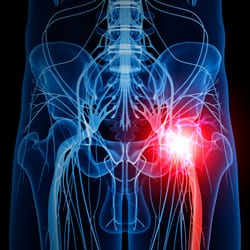Sciatica: Symptoms, Causes and Treatments
Leading orthopaedic and sports medicine treatments
Learn about Emory Orthopaedics & Spine care. Make an appointment online, find a provider or call 404-778-3350 to schedule an appointment.
What is Sciatica?
Your sciatic nerve runs from your lower back, through your hip and buttocks, and down your leg. If the pressure is placed on your sciatic nerve, it becomes irritated and can cause pain, weakness or numbness in your leg.
Sciatica is often caused by:
- A bone spur on your spine (hard calcium deposit)
- A herniated disc (when the cushion between your vertebra ruptures and leaks)
- Piriformis syndrome (muscle spasms in your buttocks)
- Pregnancy
- Spinal Stenosis (narrowing of the area around your spine)
- What Are Sciatica Symptoms?
- The hallmark symptom of sciatica is pain, numbness, or weakness that starts in your lower back and radiates through your buttocks and down your leg. Symptoms are usually only experienced on
- one side of your body.
The severity of symptoms varies widely — from a mild ache to a sharp burning sensation, to debilitating pain or weakness. The pain may get worse with prolonged sitting, certain movements, and — strangely enough — when you cough or sneeze. In extreme cases, it can cause you to lose bladder or bowel control.
What Are Sciatica Symptoms?
The hallmark symptom of sciatica is pain, numbness, or weakness that starts in your lower back and radiates through your buttocks and down your leg. Symptoms are usually only experienced on one side of your body.
The severity of symptoms varies widely — from a mild ache to a sharp burning sensation, to debilitating pain or weakness. The pain may get worse with prolonged sitting, certain movements, and — strangely enough — when you cough or sneeze. In extreme cases, it can cause you to lose bladder or bowel control.
When Should I See a Doctor?
If you have symptoms of sciatica, try:
- Resting for a day or two (be sure not to remain inactive for too long)
- Icing your back for up to 20 minutes, several times a day (for the first few days)
- Using a heat pack on painful areas (after the first few days of the onset of pain)
- Doing gentle stretches
- Taking over-the-counter pain relievers, like ibuprofen or naproxen
- It’s common to experience symptoms for several weeks. If you don’t notice an improvement using these methods at home, it’s time to see your doctor.
Get medical help right away if you have:
- Sudden, severe pain in your back with numbness or weakness in your legs
- Problems walking
- Loss of bladder or bowel control
- Symptoms that begin after a trauma, like a car accident or fall
How Is Sciatica Treated?
Your doctor will typically try medicine(s) to reduce pain and inflammation first. You might also be referred to a physical therapist to help you stretch and strengthen your muscles to improve symptoms and to help prevent a recurring injury.
In some cases, your doctor may recommend steroid injections or other treatment options, including surgery.
Leading orthopaedic and sports medicine treatments
About Emory Orthopaedics & Spine Center
Emory Orthopaedics & Spine offers comprehensive orthopedic and spine care at multiple locations across the Atlanta metro area, and our orthopedic and spine programs are ranked among the top in the nation. Our highly trained orthopaedic and spine specialists work together to diagnose and treat a wide variety of orthopaedic, spine, and sports medicine conditions.
Our physicians use innovative approaches to care – many of them pioneered right here at Emory – to ease your pain and get you back to an active lifestyle.
Emory University Orthopaedics & Spine also has among the highest patient satisfaction and best outcome rates in the nation* for your surgery. By using advanced research techniques developed by our top surgeons, we can make sure your surgery is done right the first time.
*Results based on an average of 86% patient satisfaction rating compared to a national benchmark of similar facilities at 68%. Infection rates averages at .45% for primary hip and knee procedures compared to .58% nationally.
Related Posts
-
 When pain meds could no longer control her chronic back pain and sciatica, Nancy sought spine care at Emory Healthcare to regain her active lifestyle.
When pain meds could no longer control her chronic back pain and sciatica, Nancy sought spine care at Emory Healthcare to regain her active lifestyle. -
 Having spine surgery is a big decision, and it’s in your best interest to ask questions so you know how to prepare, and what to expect.
Having spine surgery is a big decision, and it’s in your best interest to ask questions so you know how to prepare, and what to expect. -
 Peripheral nerve stimulators offer medication-free relief from low back pain. Learn about Jerry's successful treatment at Emory Healthcare.
Peripheral nerve stimulators offer medication-free relief from low back pain. Learn about Jerry's successful treatment at Emory Healthcare.
Recent Posts
-
Dec 3, 2025
-
Nov 17, 2025
-
Nov 14, 2025
-
Nov 10, 2025
-
Nov 4, 2025
-
Oct 31, 2025


